|
| |
This week in: IPSI | Africa | Americas | East Asia | Europe & Central Asia | Middle East | South Asia
|
|
|
|
| |
This week in Sub-Saharan Africa
|
|
|
|
| |
CENTRAL AFRICAN REPUBLIC: Muslims trapped in churches throughout the country
This week, reports have again surfaced that more than 600 Muslims are trapped inside a Catholic church compound in Bangassou in the southeast of the Central African Republic after their homes had been overrun by members of Christian armed groups in May 2017. Reports indicate that the Muslims are afraid of being attacked if they leave the building. Comment: Throughout CAR, as similar reports have been surfacing over the past five years, concerns among the humanitarian communities are growing. In 2014, another 650 Muslims sought shelter from the Christian anti-balaka fighters in St Peter’s Parish Church in the southwestern city of Boali and were taken in by Father Xavier Fagba. Last year, Stephen O’Brien, the former head of the UN’s humanitarian office, told AP that “the early warnings of genocide” are present. (Al Jazeera, BBC, HRW, VOA)
|
|
|
|
|
| |
DR CONGO: At least 79 people killed in new flare-up of ethnic violence
On Friday, at least 79 people died in the latest inter-ethnic violence in the village of Maze, Ituri province, with more attacks reported in three nearby villages. The Hema and Lendu communities often engage in violence against each other, with these killings being the most recent incident. Comment: The Hema cattle herders and Lendu farmers of Ituri region are antagonistic neighbors, and outbreak of low-level violence between them is common; however, in the late 1990s and early 2000s, their fight became embroiled in a broader conflict stoked by Rwanda and Uganda, which were eager to seize gold, diamond, timber, and influence as part of a wider continental war that played out inside the country’s borders. This year’s resurgent violence in Ituri is part of a patchwork of unrest in a country suffering from growing insecurity. The violence in Ituri has left over 100 people dead since mid-December and forced over 200,000 people to flee their homes. (News24, Aljazeera, Capital News)
|
|
|
|
|
| |
SIERRA LEONE: Voters go to polls using blockchain to select new leader
| |
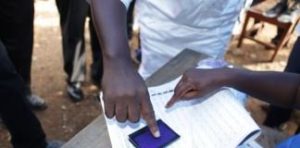
|
On Wednesday, voters headed to the polls, employing blockchain technology, to choose a new president from the leaders of 16 political parties vying to succeed current leader Ernest Bai Koroma. Front runners in the presidential race include former-foreign minister Samura Kamara for APC, former-general Julius Maada Bio of the opposition Sierra Leone People’s Party, and former UN official Kandeh Yumkella of the newly formed National Grand Coalition party. Comment: This government election is the first in the world to rely on blockchain technology, provided by Angora, to create a “fully-transparent and unforgeable voting system.” According to Dr. Jeremy Clark, voting with a blockchain system is not entirely secure, although a “voting system that uses a blockchain as a public ledger but requires voters to show up and vote in person is an excellent option for elections today.” With 16 total candidates, analysts report that the results, expected this weekend, will likely necessitate a run-off. To win in the first round, a candidate must earn 55 percent of votes. (Aljazeera, CCN, Forbes, The New York Times, Reuters, VOA)
Researched/Written by Brian Adienge
|
|
|
|
|
| |
This week in the Americas & Caribbean
|
|
|
|
| |
ARGENTINA: Former President faces trial over cover-up
On Tuesday, Argentina’s former President Cristina Fernandez De Kirchner and 11 others were charged with concealing Iran’s involvement with the bombing of a Jewish Community Center in 1994. Four of the accused have been detained, but no trial date has yet been determined. Both Iran and the charged individuals have denied any involvement with the bombing or cover-up. Kirchner faces corruption charges, but her status as a current senator provides her with immunity from being arrested; however, she can still be tried in court. Comment: The bombing of the Argentinian Israelite Mutual Association center in Buenos Aires killed 85 people and injured hundreds more. Previous investigations into this issue have stalled in past from the unexpected deaths of those investigating the charges. (ABC, Aljazeera, Guardian, NYTimes)
|
|
|
|
|
| |
UNITED STATES: President Trump plans to impose tariffs – sparking international trade conflict
On Friday, President Trump announced his plans to impose impose a 25 percent tariff on steel imports and a 10 percent tariff on aluminum imports. Trump is relying on a lesser-known aspect of the Trade Expansion Act of 1962, Section 232, that justifies the tariffs if national security is threatened. Analysts believe this precedent-setting act will have an extended effect on world trade – opening the path for other countries to respond in-kind. Some countries have already begun countering these potential tariffs: the EU announced the prospect of laying tariffs on U.S. goods including Levi jeans, Harley-Davidson motorcycles, and bourbon. Comment: These three potential EU tariffs directly affect the districts of three prominent U.S. congressional leaders, Paul Ryan (R), Nancy Pelosi (D), and Mitch McConnell (R). The U.S. tariffs will have a greater effect on allies, including South Korea, the third largest exporter of steel to the U.S., which stands to lose about USD 1.1 billion. Since 94 percent of China’s steel exports to the U.S. had already been taxed, it won’t be affected as much. On Thursday, the White House announced that Canada and Mexico will be exempt from the tariffs. (BBC, Guardian 1, 2, Reuters 1, 2, Vox, Time)
|
|
|
|
|
| |
REGIONAL: Officials sign legally binding environmental rights act
| |
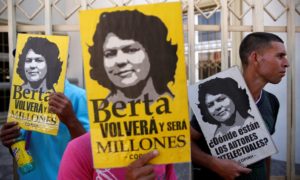
|
Legislatures from 24 Latin American and Caribbean states have signed an environmental rights act that contains measures to protect land defenders. The agreement, called the Latin American and Caribbean countries declaration on Principle 10 (LAC-P10), came two years after Honduran Berta Caceres was shot and killed by, her family believes, those constructing the dam. The treaty legally provided the guarantee of a “safe and enabling environment for persons, groups and organizations that promote and defend human rights in environmental matters.” This treaty recognizes a healthy environment as a human right that should be protected and preserved; it also provides investigative measures and justice mechanisms, codifying the natural rights of environmental wardens. Comment: In 2017, 197 people died defending the environment, according to news sources. Sixty percent of these deaths occurred in Latin America. (BNAmericas, Guardian 1, 2, 3, Treaty)
Researched/Written by Connor Murnane
|
|
|
|
|
| |
This week in East Asia & Pacific
|
|
|
|
| |
MALAYSIA: Opposition reveals election manifesto, promising a two-term limit for Prime Minister
On Wednesday, Malaysia’s Pakatan Harapan opposition alliance (PH) released its election manifesto, promising to impose a two-term limit on the positions of prime minister, the chief minister, and mentri besar. The manifesto comes a few months ahead of the 14th general election in August and pledges to complete 10 of its 60 promises within their first 100 days in office. The alliance is also considering abolishing the current system that enables the prime minister and deputy prime minister to hold multiple ministerial roles. Comment: In January, PH named 92-year old former Prime Minister Mahathir Mohamad as its candidate for prime minister. Mahathir had previously ruled Malaysia for 22 years, from 1981 to 2003. (The Strait Times, The Sundaily, Malay Mail Online)
|
|
|
|
|
| |
MYANMAR: Holocaust Museum rescinds human rights award from Aung San Suu Kyi
On Wednesday, the U.S. Holocaust Museum rescinded the 2012 Elie Wiesel Human Rights Award from Suu Kyi for failing to address the Rohingya crisis, and “to condemn and stop [the] military’s brutal campaigns” against Rohingya Muslims in the Rakhine state. The Museum said that her inaction to pressure the government to cooperate with the humanitarian aid organizations and United Nations investigators has disappointed them. The Museum has urged her to cooperate with the United Nations “to establish the truth” about Rohingya oppression. Comment: Various world leaders and fellow Nobel Prize winners, including Malala Yousafzai, Archbishop Desmond Tutu, and Shirin Ebadi, have condemned Suu Kyi’s leadership toward the Rohingya crisis. Since the latest round of violence began in August 2017, around 700,000 Rohingya have fled to Bangladesh. (Aljazeera, Reuters, CNN, USA TODAY)
|
|
|
|
|
| |
NORTH KOREA: Kim Jong-un signals willingness to discuss denuclearization
| |
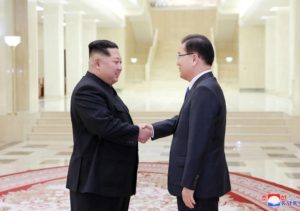
|
On Tuesday, South Korea’s presidential national security director, Chung Eui-yong, said that North Korea is willing to discuss nuclear disarmament if military threats against it are resolved and its sovereignty guaranteed. The news comes a day after a high-level South Korea delegation met with North Korea leader Kim Jong Un in Pyongyang to discuss the issue of denuclearization. The two countries agreed to open a hotline between their national presidents, who will be meeting next month. The South Korea delegation is expected to brief U.S. officials later this week on their talks with North Korea. President Trump responded to the news with a tweet, sounding optimistic but warning that this news could merely be “false hope.” Comment: The U.S. has firmly maintained a hard position against North Korea, demanding they abandon their nuclear weapons program and ballistic missile ambitions before starting negotiations between the two countries. (ABC, The New York Times, New York Post, Aljazeera, Vox)
Researched/Written by Edgar Peter Mutta
|
|
|
|
|
| |
This week in Europe & Central Asia
|
|
|
|
| |
CZECH REPUBLIC: Protestors angered about new head of the police oversight committee
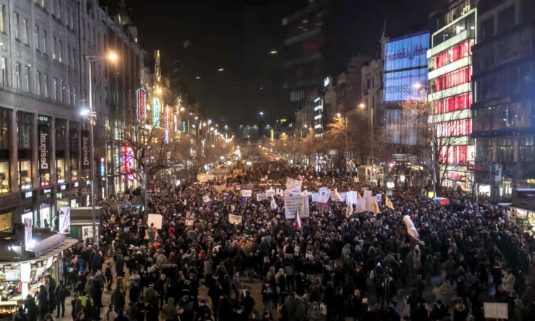
|
|
On Monday, thousands gathered in Prague and other cities to protest a communist “riot squad officer” of the 1989 Velvet revolution being named as the new chair of the police oversight committee. Zdeněk Ondráček, a member of the Czech Communist party, was confirmed last week by parliament despite evidence of his violence against pro-democracy protesters in the 1989 revolution. This week’s protests took place in Wenceslas Square, which was also the location of the 1989 demonstrations that resulted in the fall of the communist regime. Comment: Protesters are also angry with Prime Minister Andrej Babiš for supporting Ondráček’s appointment, although he said he would now try to overturn the appointment. Babis, himself, was a secret police informer in the communist era. Additionally, the protests coincide with the 70 year anniversary of communism’s takeover of power in Czechoslovakia. (Prague Monitor, Radio Prague, The Guardian, Reuters)
|
|
|
|
|
| |
ITALY: General election results in no majority wins
On Sunday, in general elections, no single Italian party received a majority, but populist parties scored high wins. The Five Star Movement (M5S), a populist anti-establishment party catering to right and left, won 32.6 percent of the vote, and the right-wing populist La Lega won a competitive 35.7 percent. Matteo Renzi’s Democratic party (center-left) and Silvio Berlusconi’s Forza Italia party (center-right) only gathered 19 percent and 14 percent respectively. Italy’s President, Sergio Mattarella (an independent), now has the task to form a coalition. Until that time, the parliament will be in stalemate. Comment: This is a shift for Italy’s political scene that is traditionally dominated by centrist parties. The European news network The Local compared the “anti-immigration and anti-establishment rhetoric” during the election campaign to the scale of such rhetoric during the Brexit referendum and U.S. Trump election. Italy has seen a huge influx of about 170,000 refugees and migrants that crossed the Mediterranean to Italy in 2014, according to U.N. figures. (The Local Italy, Al Jazeera, The Guardian 1, 2, 3, Reuters)
|
|
|
|
|
| |
REGIONAL: Bosnia and Herzegovina, Croatia, and Serbia leaders hold talks
On Tuesday, the members of Bosnia and Herzegovina’s tripartite presidency met with the presidents of Croatia and Serbia in Mostar, Bosnia to discuss security, borders, trade, and other topics for the first time in six years. The trilateral meeting also took place to discuss the Western Balkan countries’ futures in the EU, after the EU announced that aspirant countries in the Western Balkans must overcome all neighboring territorial conflicts before they can join the EU. Comment: Croatia, an EU member, said it would assist Bosnia and Serbia in their efforts to join. Serbia became an official candidate for EU Accession in 2012. Bosnia and Herzegovina formally applied for EU membership in 2016 and remains a “potential candidate” for the time being. (B92, Radio Free Europe/Radio Liberty, Reuters)
Researched/Written by Daniel Boerger
|
|
|
|
|
| |
This week in the Middle East & North Africa
|
|
|
|
| |
IRAN: President Rouhani accuses the U.S. of sabotaging 2015 nuclear deal
On Monday, Iranian President Hassan Rouhani warned Western countries that they will come to “regret” the day that the nuclear agreement collapses. Following a meeting with France’s Foreign Minister Jean-Yves Le Drian in Teheran, Rouhani said: “Remaining committed to the accord would prove to the world that negotiation and diplomacy is the best way to solve problems, but the collapse of the deal means that political talks are a waste of time.” He blamed the United States for trying to sabotage the historic deal. Comment: The 2015 deal signed in Vienna between Iran and six world powers – the U.S., Russia, Germany, France, Britain, and China, as well as the European Union – required Tehran to scale back the country’s uranium enrichment program. In exchange, UN sanctions were lifted, allowing Iran to resume trading oil and gas on the international market. (Aljazeera, AP, SIASAT)
|
|
|
|
|
| |
ISRAEL / PALESTINE: New Israeli law allows Palestinians in Jerusalem to be stripped of residency
On Wednesday, The Israeli parliament passed a “breach of loyalty” law that allows the Minister of Interior to revoke the residency rights of any Palestinian in Jerusalem deemed to be constituting a threat to the state of Israel. The measures will be “used against permanent residents who plan to carry out attacks against Israeli citizens,” right-wing interior minister Aryeh Deri said. The bill will also apply in cases where residency status was obtained by false information and in cases where “an individual committed a criminal act” in the view of the interior ministry. Comment: According to Al Jazeera, around 420,000 Palestinians in Jerusalem have “permanent residency” status as do foreigners who live in Israel and temporary Jordanian passports that are only used for travel purposes. They are stateless, as they are not citizens of Israel, nor are they citizens of Jordan or Palestine. (Aljazeera, Axios, Independent)
|
|
|
|
|
| |
SYRIA: A Russian military plane crash in Syria kills 39 aboard
On Tuesday, a Russian transport plane crashed in Syria killing all 39 people on board. The defense ministry reported that the aircraft wasn’t shot down, but had suffered a mechanical breakdown. The Antonov-26 aircraft crashed at Russia’s Khmeimim airbase in Latakia province which is the main site for Russia’s military campaign in Syria. Comment: This was the second Russian military plane to crash in Syria this year after a Su-25 ground attack jet was struck by a portable air defense missile over northern Idlib province last month. Russian President Vladimir Putin ordered “a significant part” of Moscow’s military contingent at Khmeimim to start withdrawing in December, declaring their work largely done. (Aljazeera, BBC, CNN)
Researched/Written by Mohamed Ismail
|
|
|
|
|
| |
INDIA: Tax authorities carry out raids against Gupta brothers
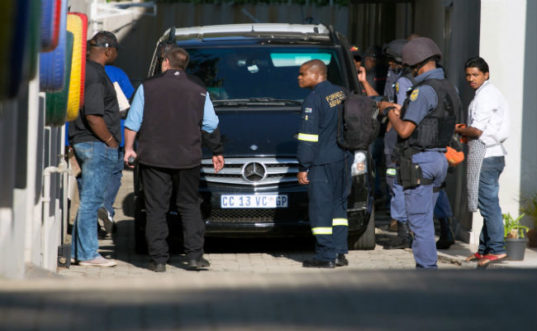
|
|
On Tuesday, tax authorities raided the residential and business properties of the Gupta brothers, Atul, Ajay and Rajesh. The Gupta brothers are a high profile and wealthy business family who are being probed for allegations of meddling in the South African government by influencing policy and accumulating wealth that they would bring back to India. South Africa’s anti-graft watchdog accused them of abusing their friendship with South Africa’s former President, Jacob Zuma, which the Gupta brothers and Zuma denied. An Indian senior income tax official stated that the Gupta brothers are being investigated for finding ways to bring illicit money they earned abroad into the country. It is unclear whether the Indian and South African governments are coordinating efforts in their investigations. Comment: The Gupta brothers went to South Africa in the early 1990s and built a commercial empire that includes several sectors such as media and mining. Last month, South African police raided Gupta properties as part of their own investigation and declared Ajay Gupta a “fugitive from justice” after he had failed to report to investigators. (The Times of India, Al Jazeera, Reuters 1, 2)
|
|
|
|
|
| |
NEPAL: Contempt case against Kantipur Daily journalists sent to the Supreme Court
On Friday, journalists from the Kantipur Daily newspaper appeared in court after the Supreme Court Chief Justice, Gopal Parajuli, summoned them on contempt charges for publishing a series of reports alleging that the Chief Justice falsified documents to conceal his date of birth. Judges in Nepal must retire at the age of 65, and the reports imply that the Chief Justice lowered his age by several years to remain in office for a longer period. Chief Justice Parajuli stated that the reports against him are an attack on the judicial system and accuses the newspaper for using objectionable language and repeating imaginary facts. In an interview with Al Jazeera, the editor-in-chief of the newspaper stated that the case will “set a precedent on how widely and narrowly the constitutional guarantee for freedom of speech will be understood.” Initially, only two of the justices, Justice Shrestha and Justice Shahi, heard the case but decided on Tuesday to send the case to the full bench; which includes the Chief Justice, despite his implications in the case. Comment: Several news outlets throughout the country published reports about the Chief Justice’s false documents, which show as many as five different dates of birth; only the Kantipur Daily, the largest newspaper by circulation, got singled out by the court. The Chief Justice also ordered the Press Council, a press watch dog body, to pre-sensor news against him. (The Kathmandu Post, Gulf Times, The Indian Express, Al Jazeera)
|
|
|
|
| |
SRI LANKA: State of emergency declared following communal violence
| |
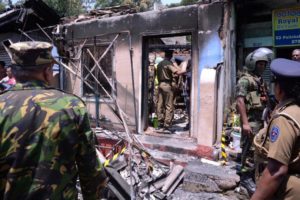
|
On Tuesday, President Maithripala Sirisena declared a 10-day state of emergency in response to communal violence between Sinhalese and Muslim civilians. The declaration follows a local curfew imposed in the central city of Kandy the day before due to the increase in attacks and riots. The increase in violence is a result of the death of a man belonging to the majority Sinhala Buddhist community who suffered injuries from an attack by a group of Muslim men. On Wednesday, the Telecommunications Regulatory Commission (TRC) issued a three-day block on social media networks across the country to prevent the spread of communal violence. Comment: This is the first issuance of a state of emergency since the civil war. Muslims account for 10 percent of the 21 million population, and Buddhists Sinhalese make up nearly 75 percent; another 13 percent of the population are Hindus. (Colombo Page, Al Jazeera 1, 2, The Guardian, Human Rights Watch, Reuters)
Researched/Written by Pamela Mhute
|
|
|
|

|
|